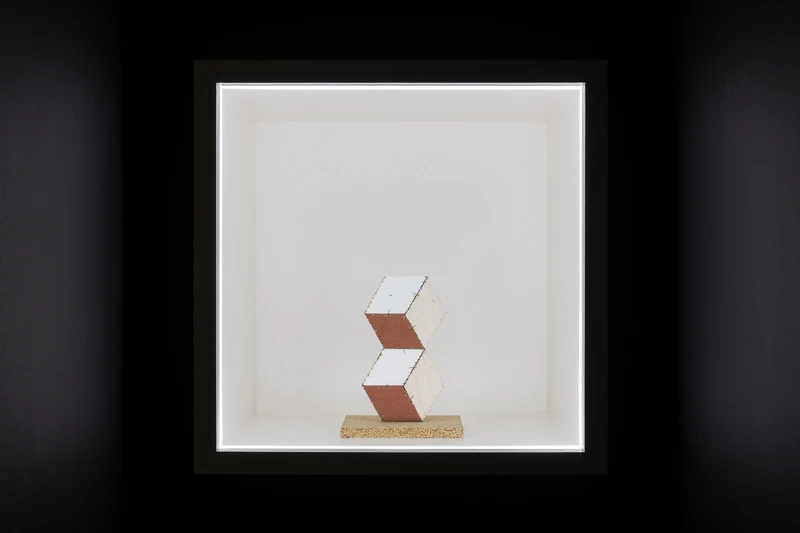Roland Hicks, Things Pile Up
22 Nov 2024-11 Jan 2025


Pippy Houldsworth Gallery is pleased to present a work by London-based artist Roland Hicks in The Box, the gallery’s micro project space. What appears at first to be a casual construction akin to a found object proves, on closer inspection, to be a deceptive means of raising wide-ranging questions.
In recent years Hicks has used gouache, paper and coloured pencil to refashion and scrupulously reproduce the texture of plywood and Oriented Strand Board (OSB), so that first we are deceived, and then surprised by such an investment of time and effort in what look like discarded offcuts. It’s only at the level of finely graduated detail that we can tell what has been done. Even the staples that seem to hold things together prove to be painted on. There is pleasure to be had in the guessing game brought about by that trompe l’oeil effect, but Hicks also raises questions about categorisation, truth, and what constitutes an artwork.
We might ask, for example, what sort of object this is: painting or sculpture, still life or abstraction, accidental or deliberate, fast or slow? The possibilities, never mind the cubes, pile up. Hicks has even suggested that his works might be seen as trompe l’oeil reproductions of fictional artworks – art at one remove. As far as speed goes, he likes to play with the degree of spontaneity, to take something that looks as if it’s been put together quite quickly, then slow it down so it takes a long time to recreate. How much does that labour add to the value we might have ascribed to the materials that we seem to see? Or is the value in the idea behind the labour?
Hicks says he’s interested in ‘the point at which the art happens, in confusing that moment… messing around with time, so that a fast creative thing and a slow creative thing happen at the same time. Time becomes elastic – you’re not quite sure where the moment of creativity is located. That leads to the question of how much aesthetic decision-making is intentional – what if you make the considered look accidental?’ We might also ask whether there is more honesty in allowing materials to just be themselves, than in simulating them faithfully. Does the deception typically involved in art rule out telling the truth? Hicks likes to cite Picasso’s formulation: ‘art is a lie that makes us realise truth’.
In collaboration with Paul Carey-Kent
Roland Hicks (b. 1967, Hampshire) lives and works in London. He studied his MFA at the Slade School Of Art and his BA at Winchester School of Art. Recent solo shows include The Fourth Wall, Hastings Contemporary (2023-2024) and Backstreet Geometry, 57W57 Arts, New York, NY (2022). Hicks is the third recipient (following Barbara Walker and Penny McCarthy) of the biennial Evelyn Williams Drawing Award, awarded at the 2021 Trinity Buoy Wharf Drawing Prize exhibition. Solo and group exhibitions include Patrick Heide Contemporary Art, London; Vane Gallery, Newcastle; Stedelijk Museum, Amsterdam; Sid Motion Gallery, London; Huddersfield Art Gallery; Oriel Davies, Newtown; Walker Art Gallery, Liverpool; Saatchi Gallery, London; and Volta, Basel. He has twice been shortlisted for the Contemporary British Painting Prize in both 2018 and 2021, and is a member of Contemporary British Painting artist group. He has also featured in The John Moores Painting Prize, The Creekside Open, Wells Art Contemporary, The Jerwood Drawing Prize, the Royal Academy Summer Exhibition and the NatWest Art Prize.